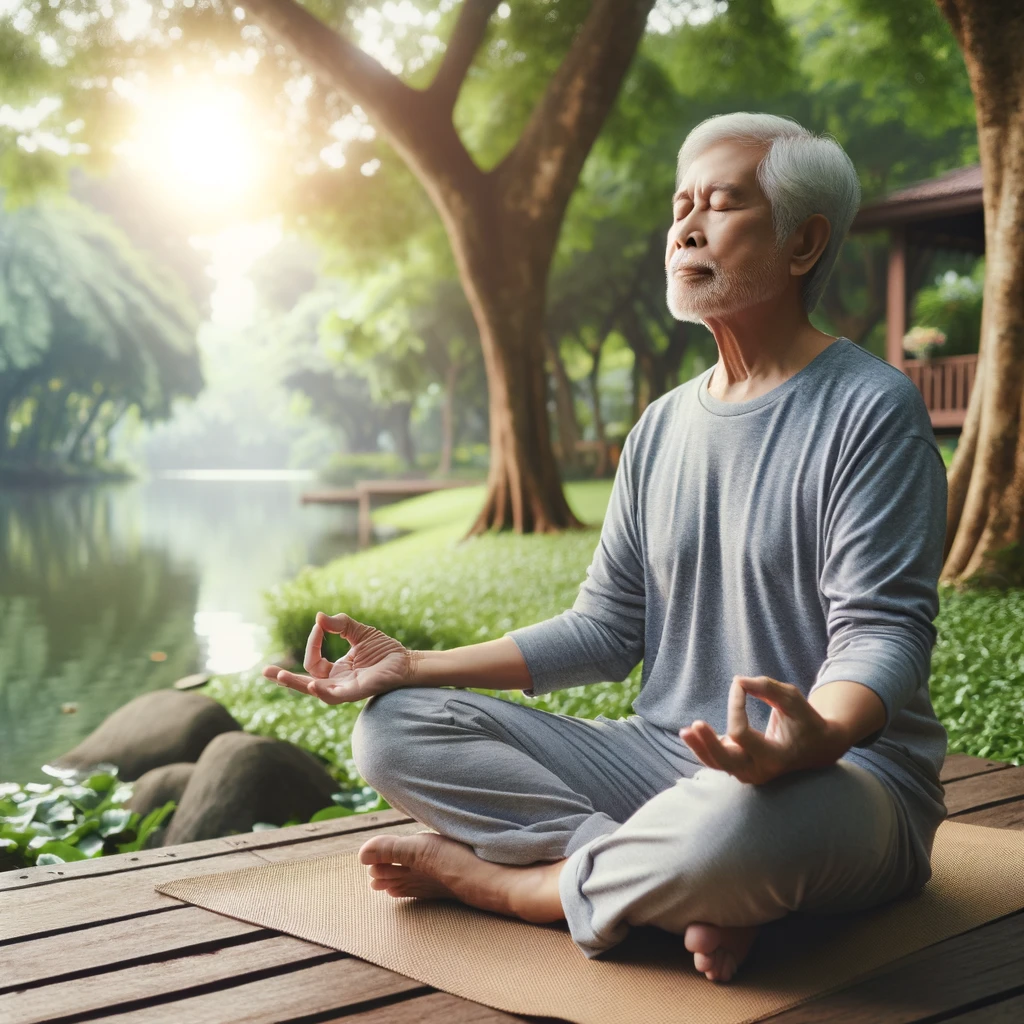For senior citizens, the principle of ‘Listen to Your Body' is a vital part of ‘Senior Health Awareness.' It involves a deeper understanding of and response to bodily signals, crucial for effective health management as they age. This approach is about more than just responding to symptoms; it's about proactive engagement with the body's cues to ensure ongoing wellness and vitality. It represents a comprehensive health strategy, blending self-awareness with active health maintenance.
Recognizing the Signs: Tuning into Senior Health Needs

As seniors age, becoming more attuned to both physical and mental health needs is essential. Mindfulness and meditation emerge as powerful tools in this process, offering numerous benefits that go beyond general wellness. These practices can significantly aid seniors in early detection and management of health concerns, leading to improved health outcomes.
Benefits of Mindfulness and Meditation for Seniors:
- Enhanced Awareness: Regular mindfulness practice helps seniors become more aware of bodily sensations and changes, facilitating early detection of potential health issues.
- Stress Reduction: Meditation is known to reduce stress levels, which is particularly beneficial for seniors, as stress can exacerbate many health conditions.
- Improved Cognitive Function: Engaging in mindfulness exercises can enhance focus and memory, key aspects of cognitive health in aging.
- Emotional Regulation: Regular meditation aids in managing emotions, reducing the risk of depression and anxiety, which are common in older adults.
- Better Sleep Quality: Mindfulness practices can lead to improved sleep patterns, a crucial factor in overall health and well-being for seniors.
- Pain Management: Meditation can also be an effective tool in pain management, helping to alleviate chronic pain, a common issue among the elderly.
- Increased Physical Health: Mindfulness can contribute to better physical health by encouraging a more active lifestyle and healthier eating habits.
Incorporating mindfulness and meditation into their routine allows seniors to take a proactive role in their health. This heightened sense of bodily awareness is a crucial component of senior health, enabling them to recognize signs and symptoms early and seek appropriate care or make necessary lifestyle adjustments.
Senior Health Awareness 🙂 Practical Tips for Senior Health Monitoring

Seniors can enhance their ‘Senior Health Awareness' through these practical monitoring strategies:
- Monitoring Vital Signs: Regularly checking blood pressure and heart rate is crucial for early detection of cardiovascular issues.
- Using Health Tracking Apps: These apps help seniors record and analyze health trends, offering a comprehensive view of their well-being.
- Observing Changes in Daily Functions: Paying attention to appetite, sleep patterns, and energy levels can indicate underlying health issues. Changes in these areas often require further evaluation, as they can be early signs of nutritional imbalances, sleep disorders, or other health concerns.
By adopting these simple yet effective monitoring methods, seniors can proactively manage their health, leading to improved overall well-being and quality of life.
Consulting Healthcare Professionals Regularly
Regular consultations with healthcare professionals are essential for senior health management. These appointments are crucial for:
- Early Detection of Health Issues: Routine check-ups allow for the early identification and treatment of conditions like high blood pressure, diabetes, and certain cancers.
- Medication Management: Healthcare providers review and adjust medications to ensure effectiveness and prevent adverse interactions.
- Personalized Health Advice: Doctors provide tailored advice on diet, exercise, and lifestyle, catering to each senior's specific health needs.
- Mental Health Support: These sessions offer opportunities to discuss mental health and receive guidance or referrals to mental health services.
- Building Trusting Relationships: Regular visits help develop a strong, trusting bond with healthcare providers, encouraging open communication about health concerns.
Maintaining consistent communication with healthcare professionals ensures seniors receive comprehensive care, improving their overall quality of life and health outcomes.
Senior Health Awareness:) The Importance of Physical Activity in Senior Health

Engaging in appropriate physical activities is a vital aspect of senior health. Regular exercise helps seniors stay in tune with their bodies and maintain physical fitness. It's not just about keeping active; it's about choosing the right kind of activities that suit their age and physical capabilities. This approach to physical fitness ensures that seniors can enjoy the benefits of exercise without undue risk, leading to improved mobility, strength, and overall well-being.
Consistent physical activity for seniors can include:
- Low-Impact Exercises: Activities like walking, swimming, or yoga are gentle on the joints and ideal for maintaining fitness in seniors.
- Strength Training: Light weightlifting or resistance exercises help preserve muscle mass and bone density, which are crucial for overall health.
- Balance and Flexibility: Exercises focused on improving balance and flexibility can reduce the risk of falls and enhance mobility.
- Group Fitness Classes: Participating in group classes offers a social aspect to exercise, making it more enjoyable and sustainable.
By integrating these forms of physical activity into their routine, seniors can ensure they are supporting their health in a safe and effective manner.
Nutrition and Hydration: Key Elements of Listening to Your Body

A balanced diet and adequate hydration are fundamental for seniors to maintain their health. Proper nutrition ensures that the body receives all the necessary vitamins and minerals, while hydration is key to keeping bodily functions running smoothly. As metabolism and digestive efficiency can change with age, a well-planned diet tailored to a senior's specific needs is crucial.
Key aspects of a balanced diet and hydration for seniors include:
- Nutrient-Dense Foods: Seniors should focus on consuming a variety of fruits, vegetables, lean proteins, whole grains, and healthy fats.
- Regular Meals: Consistent meal times help maintain steady energy levels and metabolism.
- Hydration: Drinking sufficient water is vital, as seniors are more prone to dehydration. Including water-rich foods like fruits and soups can also aid hydration.
- Special Dietary Needs: Adjustments may be necessary for those with specific health conditions like diabetes or heart disease.
By prioritizing a balanced diet and staying well-hydrated, seniors can enhance their overall health, from improving energy levels and cognitive function to supporting physical strength and immune response.
Senior Health Awareness:) Embracing Technology for Health
In today's digital age, embracing technology plays a significant role in enhancing senior health. Advanced tools and devices offer new ways for seniors to monitor and manage their health, making it easier to stay informed and proactive about their well-being. This integration of technology in health care is not just about convenience; it's about empowering seniors with the tools they need for better health management.
Key ways seniors can embrace technology for health include:
- Health Tracking Apps: Apps that monitor vital signs, track medication schedules, and even provide reminders for doctor's appointments.
- Wearable Technology: Devices like fitness trackers and smartwatches that monitor physical activity, heart rate, and sleep patterns.
- Telemedicine Services: Online consultations with healthcare professionals, providing easier access to medical advice and reducing the need for physical visits.
- Online Health Resources: Utilizing the internet to access health information, tips, and community support forums.
By incorporating these technological solutions into their health routines, seniors can gain greater control over their health, enjoy more independence, and maintain a higher quality of life.
Mental and Emotional Health: The Untold Aspect
A crucial but often overlooked part of senior health is mental and emotional well-being. It's important to balance physical health with mental and emotional care. This approach leads to comprehensive health management and enhanced well-being.
Key elements include:
- Mental Stimulation: Activities like puzzles and reading keep the mind sharp.
- Emotional Health: Managing stress and nurturing positive relationships are vital.
- Social Engagement: Active social lives through community or family interactions boost emotional health.
- Mindfulness: Practices like meditation improve mental clarity and reduce stress.
Focusing on these aspects helps seniors achieve a balanced lifestyle, catering to both physical and emotional needs for overall well-being.
Conclusion: Embracing a Holistic Approach to Senior Health
For optimal senior health, a holistic approach is crucial. Mindful attention to the body, regular health checks, and embracing technology are key. Staying active and eating well also play a vital role. Together, these practices enhance well-being and improve quality of life for seniors.


